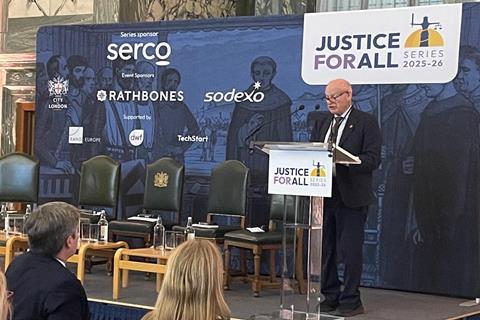Lord Neuberger of Abbotsbury, former president of the Supreme Court and former master of the rolls, last night criticised the failure of successive governments to increase legal aid rates in line with inflation. He was speaking in an event at the Central Criminal Court to inaugurate the Justice for All series of lectures, a year-long initiative organished by the City of London.
Speaking on the rule of law, Lord Neuberger said: ‘We live in a world where the law is increasingly complex, so access to independent properly trained lawyers is an ever more essential ingredient. Legal experts are needed to advise and speak for individuals and companies and to assist judges when it comes to identifying interrupting and applying the law. If access to lawyers for advice and representation in courts is restricted to the rich or the few, you do not really have the rule of law.’
England and Wales has ‘much to be proud of when it comes to its record on democracy and the rule of law’, Lord Neuberger said, adding: ‘Without the rule of law, society would either fall apart or be downtrodden.’ Speaking of judges’ independence and their ‘unelected status, long may that continue', he said.
But when it comes to ‘ordinary people caught up in the criminal, civil or family justice systems, we are in a much less satisfactory situation and we ought to be doing much better’, he said. ‘In contrast with high-value civil cases where legal costs are rarely crucial, the plight of ordinary people with ordinary problems in civil and family cases is disturbing.’

Read more
Though he noted ‘some recent improvements in hearing times in family cases', he added that 'they still take far too long’. It was ‘hard to rejoice’ in a small increase in legal aid rates this year, when ‘legal aid for advice and representation in civil and family cases which was barely adequate in 1996 has been progressively shrunk in both scope and quantum over the past 30 years, he said.
‘Behind these figures lies a strong likelihood of people with rights not being aware of them or not having the ability or courage to seek to enforce them. When justice systems are seen as inaccessible or serving just a few, frustration, disillusionment and discontent follow, which can have significant…consequences.’
The ‘hundreds of millions of pounds being spent each year on lawyers and others on prolonged public inquires’ could be spent on the justice system, Lord Neuberger said. While ‘at least some’ public inquiries were ‘plainly necessary’, the ‘whole structure…needs to be reconsidered so they can be conducted much more cheaply and much more quickly’.
Delays and postponements in the Crown court are not ‘consistent with the rule of law’, the judge said. Speaking of Sir Brian Leveson’s ‘good proposals’ which include recommendations of juryless trials in areas such as complex fraud cases, Lord Neuberger gave his seal of approval. He said: ‘Objections on the basis of a notional right to a jury trial are misconceived. The great majority of criminal cases are already not decided by juries. There is no suggestion removing juries generally from the criminal justice system and there certainly should be no such suggestion.’
This article is now closed for comment.



























11 Readers' comments